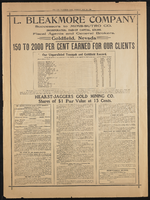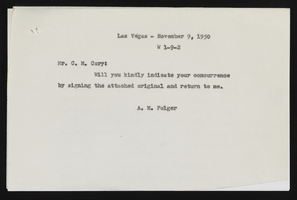Search the Special Collections and Archives Portal
Search Results
Don Ashbaugh Papers on Nevada Ghost Towns
Identifier
Abstract
The Don Ashbaugh Papers (1950-1960) document Las Vegas history, Nevada history, and ghost towns. The collection is comprised of the working manuscript of Don Ashbaugh's book, Nevada's Turbulent Yesterday: A Study in Ghost Towns. The collection also contains typescript drafts, newspaper clippings, and a geographical index of Nevada ghost towns.
Archival Collection
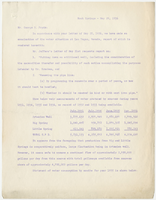
Report on Las Vegas water situation from C. E. Swann (Rock Springs, Wyoming) to George B. Pryde, May 29, 1936
Date
Archival Collection
Description
Report on water supply and use in Las Vegas. C. E. Swann, one of the authors of the report was Chief Engineer of the Union Pacific Coal Company. The addressee, Mr. George B. Pryde was Vice President of the Union Pacific Coal Company. The coal company was located in Rock Springs, Wyoming. Document includes water consumption data.
Text
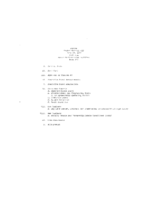
Meeting minutes for Consolidated Student Senate, University of Nevada, Las Vegas, July 10, 1979
Date
Archival Collection
Description
Text
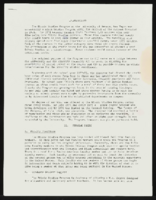
UNLV Ethnic Studies program background and list of needs
Date
Archival Collection
Description
From the Roosevelt Fitzgerald Professional Papers (MS-01082) -- Personal and professional papers file.
Text
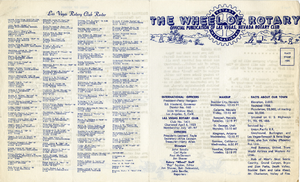
The Wheel of Rotary Las Vegas Rotary Club newsletter, December 22, 1949
Date
Archival Collection
Description
Text
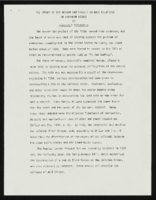
"The Impact of the Hoover Dam Project on Race Relations in Southern Nevada": manuscript draft by Roosevelt Fitzgerald
Date
Archival Collection
Description
From the Roosevelt Fitzgerald Professional Papers (MS-01082) -- Unpublished manuscripts file.
Text

Transcript of interview with Henry Kronberg by Barbara Tabach, February 26, 2015 and April 13, 2015
Date
Archival Collection
Description
Interview with Henry Kronberg by Barbara Tabach in two sessions, February 26 and April 13, 2015. In the first session Kronberg talks about his childhood in Germany and Poland and his experience being imprisoned by the Gestapo, and transported to a concentration camp. He survived the Holocaust and met his wife, and they moved to the United States in 1946. He discusses being reunited with his sister in Las Vegas after decades of searching, and moved his family to Las Vegas in 1962. Kronberg talks about becoming involved with Jewish life here, and his wife, Lillian's involvement at Temple Beth Sholom. In the second session, Kronberg discusses purchasing Stoney's, a loan and pawn shop, including some of the clientele and merchandise. He also discusses other social and environmental concerns like anti-Semitism and water resources in Southern Nevada.
Henry Kronberg was born in 1920 and spent his early childhood in a town on the border of Poland and Germany, about 40 miles from Krakow. For years he felt uncomfortable telling his story of surviving the Nazi concentration camps of World War II. Today his name is linked to the Sperling Kronberg Mack Holocaust Resource Center in Las Vegas. And in his soft-spoken manner, Henry recalls his ordeal of loss of family and survival during this most heinous of situations through backbreaking labor and ingenuity. At the end of the war, Henry met the love of his life, Lillian, also a survivor. The two married in 1946 in Frankfurt and immigrated to New Jersey where she had relatives. He describes their difficulties and the various jobs he held until becoming an excellent baker. Then in 1962 an interesting choice took him to a bar mitzvah in Canada. While there the dinner conversation lead him to a great discovery?his sister Lala had survived and was living in Las Vegas. Soon he moved his wife and daughter to Las Vegas. His first foray into business was with his brother-in-law. However, soon it was important to be independent and to control his own destiny. He purchased a going concern, Stoney's Pawn Shop, from Dr. Alexander Coblentz, one of the city's first doctors. He became the fourth owner of Stoney's and operated it until selling it to Steven Mack in 1998. Henry and his wife were active in the Jewish community. They joined Temple Beth Sholom and became fast friends with many of the early leaders of Las Vegas and became a respected member of the secular and Jewish communities.
Text
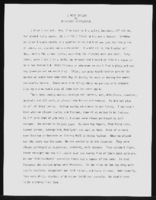
"I Miss Saigon": article draft by Roosevelt Fitzgerald
Date
Archival Collection
Description
From the Roosevelt Fitzgerald Professional Papers (MS-01082) -- Drafts for the Las Vegas Sentinel Voice file. On how lead roles should feature actors of varying races.
Text

